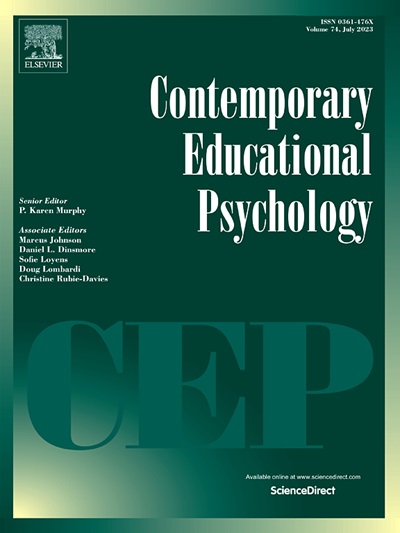执行功能在高中生体育活动与学业成绩之间的中介作用
IF 3.8
1区 心理学
Q1 PSYCHOLOGY, EDUCATIONAL
引用次数: 0
摘要
一些研究强调了身体活动、执行功能和学习成绩之间复杂的相互作用。然而,这些变量之间的微妙关系需要进一步研究体育活动和执行功能作为学业成功的预测或中介的作用。一项研究以方便的样本进行,包括172名西班牙高中生。这项研究评估了身体活动水平、执行功能(特别关注认知成分,如注意力和抑制,以及情绪调节的情感成分)和学业成绩。研究结果揭示了几个关键的见解:首先,身体活动和认知执行功能(特别是注意力和抑制)都是学习成绩的重要预测因素。然而,情绪调节并没有显示出显著的预测关系。其次,认知执行功能(注意和抑制)在体育活动与学业成绩之间起部分中介作用。这些结果表明,针对改善身体活动水平和认知执行功能,特别是注意力和抑制能力的干预措施,可能会对义务中等教育学生的学业成绩产生积极的影响。本文章由计算机程序翻译,如有差异,请以英文原文为准。
The mediation role of executive functions as predictors between physical activity and academic performance in high school students
Several studies have highlighted the intricate interplay between physical activity, executive functions, and academic performance. However, the nuanced relationships among these variables necessitate further investigation into the roles of physical activity and executive functions as predictors or mediators of academic success. A study was conducted with a convenience sample comprising 172 Spanish high school students. This study assessed physical activity levels, executive functions (specifically focusing on cognitive components such as attention and inhibition, as well as the affective component of emotional regulation), and academic performance. The findings revealed several key insights: firstly, both physical activity and cognitive executive functions (specifically attention and inhibition) emerged as significant predictors of academic performance. However, emotional regulation did not show a significant predictive relationship. Secondly, cognitive executive functions (attention and inhibition) were found to partially mediate the association between physical activity and academic performance. These results suggest that interventions targeting improvements in both physical activity levels and cognitive executive functions, particularly attention and inhibition, may yield positive outcomes in terms of academic performance among students in compulsory secondary education.
求助全文
通过发布文献求助,成功后即可免费获取论文全文。
去求助
来源期刊

Contemporary Educational Psychology
PSYCHOLOGY, EDUCATIONAL-
CiteScore
16.50
自引率
3.90%
发文量
74
期刊介绍:
Contemporary Educational Psychology is a scholarly journal that publishes empirical research from various parts of the world. The research aims to substantially advance, extend, or re-envision the ongoing discourse in educational psychology research and practice. To be considered for publication, manuscripts must be well-grounded in a comprehensive theoretical and empirical framework. This framework should raise critical and timely questions that educational psychology currently faces. Additionally, the questions asked should be closely related to the chosen methodological approach, and the authors should provide actionable implications for education research and practice. The journal seeks to publish manuscripts that offer cutting-edge theoretical and methodological perspectives on critical and timely education questions.
The journal is abstracted and indexed in various databases, including Contents Pages in Education, Australian Educational Index, Current Contents, EBSCOhost, Education Index, ERA, PsycINFO, Sociology of Education Abstracts, PubMed/Medline, BIOSIS Previews, and others.
 求助内容:
求助内容: 应助结果提醒方式:
应助结果提醒方式:


